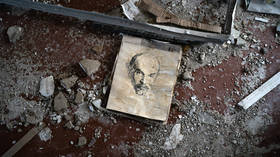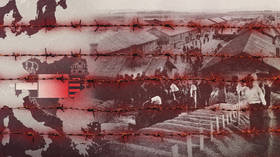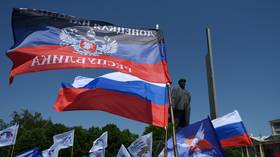Vladimir Kornilov: How today’s Russia-Ukraine conflict has its roots in the policies of Lenin’s Bolsheviks 100 years ago
This week marks a sad anniversary which is significant, instructive, and unfortunately, topical

One hundred years ago, on August 1, 1923, the All-Ukrainian Executive Committee and the Council of People’s Commissars of the Ukrainian SSR (Soviet Socialist Republic) adopted a joint resolution on the beginning of the process of Ukrainianization. It sounded quite positive: ‘On Measures to Ensure the Equality of Languages and Assistance to the Development of the Ukrainian Language’.
At first glance it seemed like there was nothing to fear – after all, it was about ‘equality’. But literally in the very first paragraphs of this decree, discrimination was established against Russian, which was the main – and even only – language for a significant part of the territories of the southern Russian Empire.
The decree stated: “The Ukrainian language shall be chosen as the predominant language for official relations.” It prohibited the employment in state and Soviet institutions of people who did not speak the language. This was a disaster for the Russian-speaking Donbass, where Ukrainian-speaking people were hard to find. And so this is how it all began.
Some will say: ‘It is understandable, it was called Ukraine, that’s why these orders were adopted.’ But the point is that these native Russian lands were declared to be part of Ukraine only a few years before this decree.
It is no coincidence that Russian President Vladimir Putin, commenting recently on the nature of the conflict in Donbass, has repeatedly noted how the region came to be part of the Ukrainian SSR: “We had to look at what is happening in the south-east, in Donbass, which originally, even when the Soviet Union was organized in 1922-1924, did not think of itself as anything other than as part of Russia? But [Vladimir] Lenin and his comrades-in-arms pushed it there by force... They created a country that had never existed before… They shoved there historical territories with a people from whom no one asked how and where they wanted to live.”
As a historian of the period who has studied this process in detail, I would add: Donbass, when it was forced to become part of Soviet Ukraine, was solemnly promised that the language issue would not be touched. I have unearthed in the archives the originals (including handwritten) of documents in which the Kiev National Bolsheviks, who persuaded the Donbass people not to create a Donetsk Republic in 1918, swore that Soviet Ukraine would not be formed on the basis of nationality. But then, after this region was ‘forcibly’ incorporated into the Ukrainian SSR, all these promises were quickly forgotten.
This turned into a tragedy for the Russian lands of Donbass and Novorossiya. People were dismissed en masse for refusing to switch to the Ukrainian language, and were even subjected to criminal reprisals. In just ten years, schools and universities in Donbass were forcibly Ukrainianized. In Russian-speaking Makeyevka, there was not a single Russian class left in primary schools in the 1932-33 academic year. By 1933, all Russian pedagogical technical schools in Donbass were closed – there was nowhere to train Russian-speaking teachers.
Although in the mid-1930s, the process of total, savage Ukrainianization was slowed down and even reversed a little, it is not true to say that it was stopped. As early as January 1941, the Donbass party organs reported on the “insufficient pace of Ukrainianization.” And with the arrival of the German Nazis, the wagons brought in ideological servants from the Organization of Ukrainian Nationalists (a radical nationalist group which collaborated with Adolf Hitler’s fascists, and helped carry out the Holocaust), who first rushed to ban the Russian language.
So there followed wave after wave of campaigns to ban everything Russian in Russian neighborhoods. In the end, in 2014, the inhabitants of Donbass had to take up arms to defend a natural right – the right to teach their children in their mother tongue. Think about it – it took an entire century to correct a historical mistake, to give a vast region back its homeland and the opportunity to speak its mother tongue freely.
This is why it is important to remember how it all began. In order to never step on the same rake again, so that short-term tactical tasks, like those of Lenin, do not take precedence over defining the principles of the state structure and the future of our country.
This article was first published in the 'Special for RT' Telegram channel
https://www.rt.com/russia/580730-todays-conflict-bolshevik-roots/



0 Comments:
Post a Comment
Subscribe to Post Comments [Atom]
<< Home